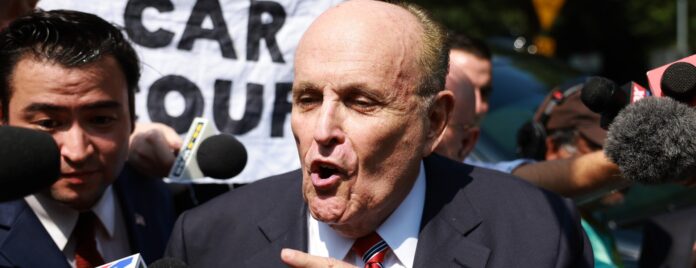Rudolph Giuliani’s bankruptcy has striking similarities to that of right-wing conspiracy theorist Alex Jones, who recently discovered that filing for bankruptcy doesn’t necessarily clear debts from defamation rulings.
Giuliani, the former New York mayor who led efforts to overturn the 2020 presidential election, filed for Chapter 11 in the Southern District of New York bankruptcy court on Thursday. He faces $148 million in judgments stemming from his discredited campaign to keep Donald Trump in the White House. Giuliani’s bankruptcy will give him some breathing room from debt collection efforts. But Jones’ recent losses in his own Chapter 11 case have shown that damages stemming from findings of “willful and malicious injury” aren’t easy to wipe out.
Sign up for The Brief, a daily afternoon newsletter showcasing Bloomberg Law’s top stories.
The Infowars host’s filing comes a few months after a bankruptcy judge found Jones can’t use bankruptcy to avoid paying $1.1 billion he owes families of the Sandy Hook Elementary School massacre victims for airing lies about them on his talk show. Rudolph Giuliani is likely to face the same challenges in seeking to discharge his debts.
“Rudy Giuliani’s filing is just the latest in a defamation-to-bankruptcy pipeline,” said Christopher D. Hampson, a bankruptcy professor at the University of Florida Levin College of Law. “Unfortunately for Mr. Giuliani, bankruptcy is not a magic wand.”
Read More: Alex Jones Loses, Cardi B Wins on Flip Sides of Bankruptcy Law
Breathing Room
The bankruptcy filing came shortly after Judge Beryl A. Howell of the US District Court for the District of Columbia allowed 2020 Georgia poll workers Ruby Freeman and Shaye Moss to go after his assets immediately, after a jury ordered the $148 million in judgments. The creditors could ask a judge to find that Giuliani can’t discharge his defamation debts, or try to dismiss his Chapter 11 for a lack of good faith.
Still, it’s possible that a court could deem Giuliani’s case a legitimate use of the bankruptcy code, said Nicholas Koffroth, a bankruptcy attorney with Fox Rothschild LLP.
Jones and ‘Bad Faith’
Juries in Texas and Connecticut ordered Jones last year to pay the Sandy Hook families a combined $1.4 billion in connection with his false claims that the 2012 massacre was a hoax. Jones filed for personal bankruptcy in December 2022 and recently proposed paying the families $55 million over 10 years.
Read More: Alex Jones Offers Sandy Hook Families $55 Million Over 10 Years
Though Jones’ bankruptcy is proceeding in a different judicial district, it could still be informative in Giuliani’s case.
‘Willful and Malicious’
If the bankruptcy isn’t initially tossed due to a bad faith finding, the big question will be: can Giuliani get rid of his debt from the civil judgment?
Freeman and Moss in their complaint said Giuliani defamed them as a result of his willful and malicious conduct. Howell entered a default judgment on liability against Giuliani for failing to keep and produce documents in discovery—just as Texas and Connecticut state courts did in the defamation cases against Jones.
The judgment in Giuliani’s case appears to include findings aimed at satisfying bankruptcy’s “willful and malicious” conduct requirement, Fox Rothschild’s Koffroth said.
The key issue will ultimately be whether the facts established in the judgment against Giuliani meet the “willful and malicious” test under federal law, said Bruce Markell, a Northwestern University law professor and former bankruptcy judge.
“As Alex Jones found out,” he said, “they often do.”
The case is Rudolph W. Giuliani, Bankr. S.D.N.Y., No. 23-12055, petition 12/21/23.
